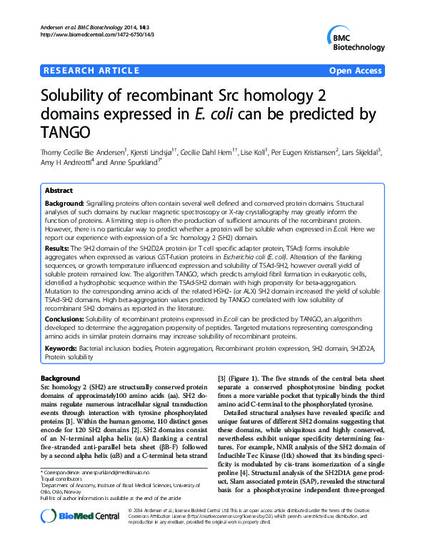
Signalling proteins often contain several well defined and conserved protein domains. Structural analyses of such domains by nuclear magnetic spectroscopy or X-ray crystallography may greatly inform the function of proteins. A limiting step is often the production of sufficient amounts of the recombinant protein. However, there is no particular way to predict whether a protein will be soluble when expressed in E.coli. Here we report our experience with expression of a Src homology 2 (SH2) domain. The SH2 domain of the SH2D2A protein (or T cell specific adapter protein, TSAd) forms insoluble aggregates when expressed as various GST-fusion proteins in Escherichia coli (E. coli). Alteration of the flanking sequences, or growth temperature influenced expression and solubility of TSAd-SH2, however overall yield of soluble protein remained low. The algorithm TANGO, which predicts amyloid fibril formation in eukaryotic cells, identified a hydrophobic sequence within the TSAd-SH2 domain with high propensity for beta-aggregation. Mutation to the corresponding amino acids of the related HSH2- (or ALX) SH2 domain increased the yield of soluble TSAd-SH2 domains. High beta-aggregation values predicted by TANGO correlated with low solubility of recombinant SH2 domains as reported in the literature. Solubility of recombinant proteins expressed in E.coli can be predicted by TANGO, an algorithm developed to determine the aggregation propensity of peptides. Targeted mutations representing corresponding amino acids in similar protein domains may increase solubility of recombinant proteins.
Available at: http://works.bepress.com/amy_andreotti/10/

This article is from BMC Biotechnology 14 (20140: 3, doi:10.1186/1472-6750-14-3. Posted with permission.